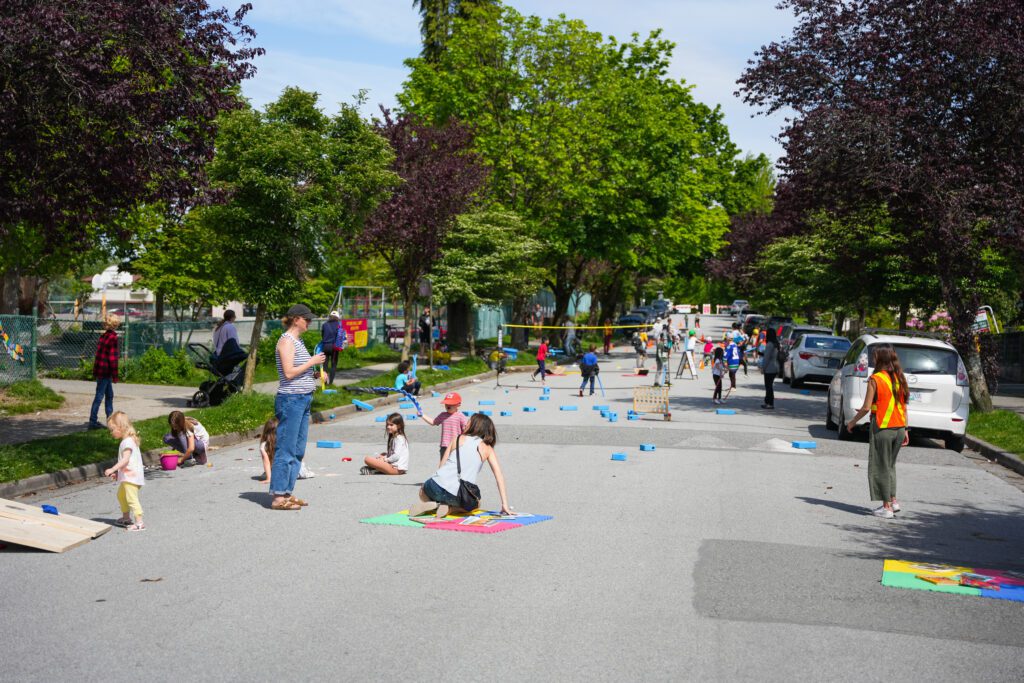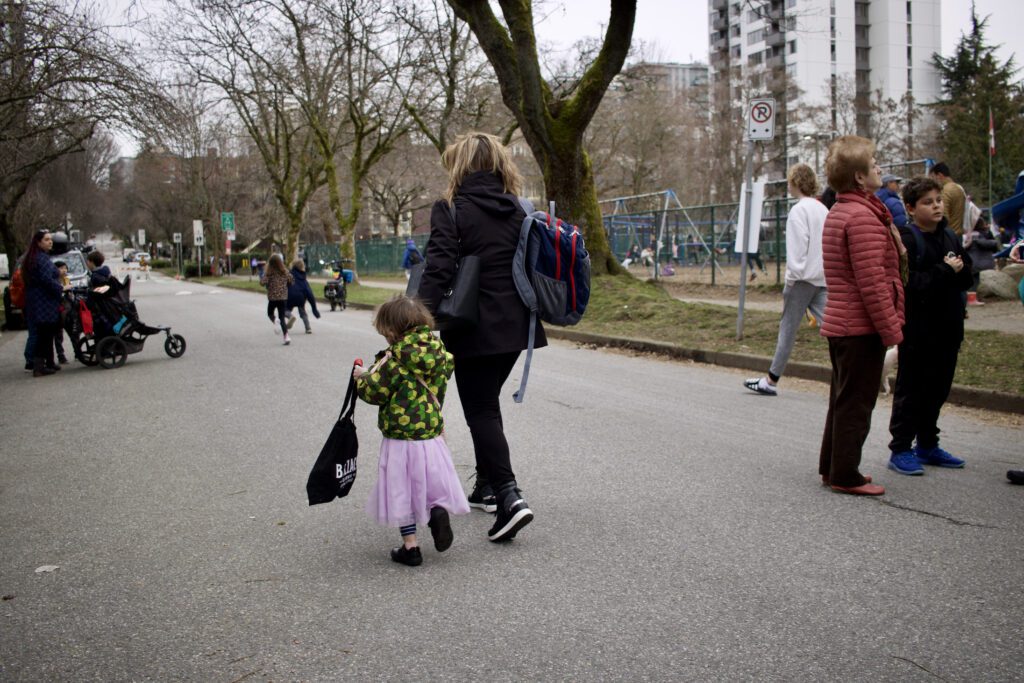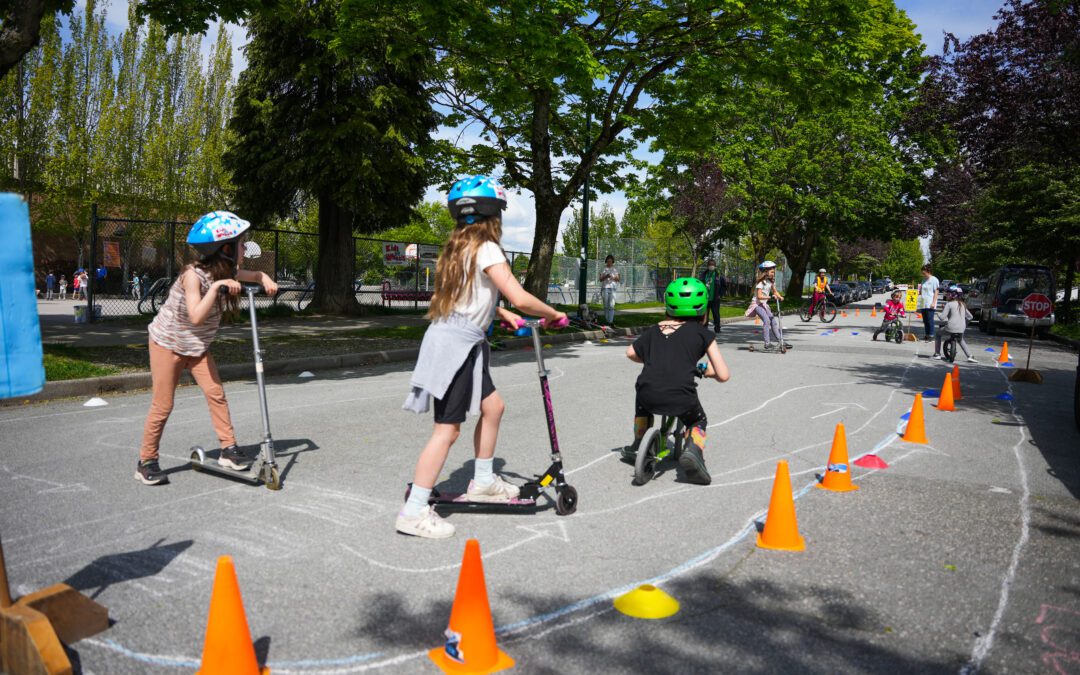The Government of British Columbia’s Ministry of Transportation and Infrastructure recently granted Green Communities Canada (GCC) $400,000 to lead a provincial expansion of the National Active School Streets Initiative (NASSI). This provincial expansion is known as the British Columbia School Streets Initiative (BCSSI) and is a collaboration between GCC and The Society for Children and Youth of BC (SCY). The BCSSI will fund up to 10 School Streets projects between 2025 to 2028.
GCC will provide administrative support for the project, and SCY will lead the project delivery and provide direct technical support to the participating communities. As a sub-project of NASSI, BCSSI will receive additional support from the NASSI project partners – 8 80 Cities, Centre d’écologie urbaine, Université de Montréal, University of British Columbia, Queen’s University, and Toronto Metropolitan University. The BCSSI project will also provide significant contributions to the matched fund totals of the $6 million national initiative.
What are School Streets?
School Streets provide children with access to safer school spaces that encourage active free play. The program uses temporary barricades and road closure signage to create car-free spaces in front of schools at the start and/or end of the school day.
The History of School Streets
Since 2021, the City of Vancouver and the City of Victoria have organized School Streets interventions at schools, with the City of Vancouver exploring the possibility of a year-round street closure. In 2023, the City of Kamloops conducted a two-week School Streets pilot program called the Safer School Streets program. The BCSSI project builds upon the existing expertise and momentum in British Columbia to further develop capacity and reach new communities.

Families enjoying the School Street at Hastings Elementary School (photo by: The Society for Children and Youth of BC)
Project Details
Communities in British Columbia will participate in the national Community of Practice as part of the “Aspiring” stream, and those with demonstrated readiness will implement either a pilot or a pop-up School Street. The pilot School Street implementations will be up to a month-long with the goal to increase community capacity for coordination, test new approaches, and evaluate the impact in different social and geographic contexts. Pop-up implementations will be at least one-week long and will aim to build positive community support for School Streets in areas where there is no previous implementation experience.
This was #ComoxSchoolStreet this afternoon. The #SchoolStreet has been an incredible community asset for the #WestEnd for the past two years. #ActiveTransport
[Video shows children riding bikes, playing badminton and running] pic.twitter.com/z0BA8ySz7i— Lucy Maloney (@Lucyincanada) April 14, 2023
Training
Participating communities will benefit from a national Community of Practice, a tailored training program, and direct technical support through provincial cohort meetings. The training process will be led by 8 80 Cities, Centre d’écologie urbaine, and SCY, and will be accompanied by a range of materials and resources to help share knowledge, troubleshoot implementation challenges, and accelerate uptake.
Selection
Communities across British Columbia are invited to submit an expression of interest form to participate in the program. More information on eligibility criteria and how to submit the expression of interest form is available here. The deadline to submit a form has been extended to Thursday, October 24, 2024, at 11:59 p.m. PST.
SCY will use an assessment framework to review all submissions and evaluate each community’s project suitability and readiness. Up to 10 communities will be selected to participate in the national Community of Practice and training program and can expect to implement their first School Street as early as September 2025!
Implementation
Communities that are identified as low capacity, such as rural and/or Indigenous communities, may access annual participation stipends and additional supports. SCY is funded to provide direct planning, implementation, and evaluation activities for up to two communities, for example, coordinating one pop-up and one pilot. Furthermore, SCY will provide space activation services for approximately three communities, leading engaging programs at select School Street sites.
Additional project details are available on the NASSI program page.

A parent walking with their child through the School Street at Lord Roberts Elementary School (photo by: Green Communities Canada)
Future Impact
School Streets are an impactful community-led intervention that creates safer conditions for children and their families to engage in active journeys to and from school. This project is expected to significantly raise awareness for School Streets, build critical local capacity, and make a tangible impact in transforming school-adjacent streets across the province.
If you would like to see a School Street in your community, visit the Society for Children and Youth of BC’s School Streets page to learn more about eligibility criteria and how you can apply to join the project!
Thank you to our funders the Public Health Agency of Canada and the Ministry of Transportation and Infrastructure of British Columbia / Merci à notre bailleur de fonds l’agence de la santé publique du Canada et le ministère des transports et de l’infrastructure de la Colombie-Brittanique

Recent Comments